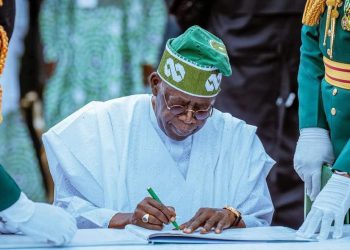By Ezenwa Nwagwu
During a recent session with the Set 23 class at the African Centre for Leadership, Strategy and Development (Centre-LSD) Leadership School, where I’ve been privileged to be a faculty member and teach aspiring leaders for several years, I felt a deep urge to return to the basic principles that truly define leadership – service, empathy and responsibility.
Why does this matter? My purpose for this discourse, as I also told the class, is simple but urgent—to spark deeper reflection that can help us rethink our understanding of leadership. I believe that only by having this conversation and having a shift in mindset can we begin to redirect the course our country is currently on.
Too often, Nigerians talk about the steady decline of purposeful leadership among the political class. However, the biggest challenge for me is that across all spheres of our national life, from community leadership to organisational and religious leadership, there is a growing decline in purposeful leadership

.
This conversation therefore is to challenge us to have a paradigm shift that puts impact-making above office-holding, to go beyond our understanding of leadership and build a new crop of leaders that embrace humility, sacrifice, responsibility and empathy.
Unfortunately, in today’s Nigeria, we confuse leadership with position. We measure it by titles, convoys, and ceremonies. But as I told the class, true leadership is not about the decoration of titles. It is about setting examples, sacrificing for others, mentoring future leaders, and not being in self-interest.
However, what is even more troubling is that we have outsourced leadership to only politicians. Too many citizens believe that leadership begins and ends with politicians or public office holders. That belief is not only misleading. It is dangerous.
It is dangerous because, in my opinion, it has become an excuse for people at different levels of responsibility to escape accountability. My point is if you live in a community where the roads are bad, and you gather neighbours to fix them, you have provided leadership. If you help a child stay in school, you have led. If you consistently pay your estate security levy and contribute to your residents’ association, you are demonstrating leadership. These are not grand acts, but they are meaningful, and they matter.
Like I told the class, the motivation for leadership should not be to lead. The motivation for leadership is not title but service.
Unfortunately, if we were to run a random survey today on how the aspiring generation perceives leadership, the results would likely be troubling. Somewhere along the line, in the noise and struggle of our national life, we seem to have lost both the meaning and the true purpose of leadership.
For me, this is worrisome. But also more troubling is the question of role models. If we ask, “Who are the role models?” the answers are not always encouraging. Many of the people in the public eye, whether in politics, business, or community life, seem more focused on power and personal gain than on service. When the examples we see reward wealth and connections over honesty and hard work, it becomes difficult for young people to understand what true leadership should look like.
This decline is not accidental. It is the product of a culture that rewards status over substance, loyalty over competence, and short-term gain over long-term impact. In politics, in business, and even in our communities, we have normalised leadership as a position to be enjoyed rather than a duty to be discharged. The result is a leadership vacuum that leaves too many Nigerians without guidance, hope, or protection.
So, how to we get back to the basics?
This is why I define leadership as “response-ability”—the ability and willingness to respond to the needs and challenges around you. For me, this conversation is important, not just for its content but for its timing. Nigeria is at a crossroads, facing both a crisis of governance and a crisis of leadership.
True leadership begins with humility. It is driven by empathy—the ability to feel the pain of others and be moved to act. If you do not show concern for your immediate environment, if you turn away from your neighbour’s need, if you wait for government to do everything, then you are not preparing to lead, you are avoiding it.
It is time we redefine true leadership. Leadership is not limited to political appointments or public offices.
It is not the exclusive preserve of those who win elections or carry titles. If you are waiting to hold office before you serve people, then you have misunderstood leadership entirely.
I challenged the students, and I challenged every Nigerian reading this: Have you taken a child off the street? Have you stood up for a neighbor in need? Who are you mentoring?
Personally, I believe that the footprints we leave behind as leaders are not in the skyscrapers we build or the wealth we amass. Though, there is absolutely nothing wrong with it, but what matters most is in the lives we touch and the communities we uplift.
In Nigeria today, we have too many monuments and too few living testaments of compassion. The roads and the buildings may bear our names, but do the people in our streets feel our presence?
During my interaction, I reminded the class that when history remembers us, it will not remember how many convoys we commanded or how many chieftaincy titles we collected. It will remember the lives we touched, the vulnerable we protected, and the hope we restored.
This is why I told the class that each of us belongs to three key communities: the community of our birth, the community of our residence, and the community where we work. And I asked: What are you giving back to each of these?
If you ignore your community’s struggles, refuse to engage in its development, or believe that “it’s someone else’s job,” then you have missed the point. Leadership isn’t something you switch on after winning an election—it’s a habit you build long before the spotlight finds you.
At the end of my class, I asked the students to perform one simple act of kindness. The feedback I received was powerful. Many said how good they felt after doing something helpful for someone else. It didn’t matter whether it was big or small. What mattered was the spirit behind it. That, for me, is what leadership looks like: empathy in action.












